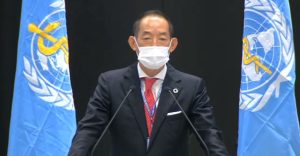Staffers have accused the top director of the World Health Organization in the Western Pacific of racist, unethical, and abusive behavior that has undermined the U.N. health agency’s efforts to curb the coronavirus pandemic.
The allegations were laid out in an internal complaint filed in October and in an email last week sent by unidentified staff to WHO’s senior leadership and its executive board and obtained by the AP. Two of the authors said more than 30 current and former WHO officials were involved in writing the email.
The internal complaint and email describe a “toxic atmosphere” with “a culture of systemic bullying and public ridiculing” at WHO’s Western Pacific headquarters in Manila, led by Dr. Kasai Takeshi, director of a vast region that includes China and Japan. The AP also has obtained recorded snippets of meetings where Kasai is heard making derogatory comments about staff based on nationality. Eleven former or current WHO staffers who worked for Kasai told the AP he frequently used racist language.
The complaint and message also accused Kasai of improperly sharing potentially sensitive vaccine information with his home country, Japan.
In an email to the AP, Kasai denied allegations of racism and unethical behavior.
“I ask a lot of myself, and our staff,” he said. “This has particularly been the case during the COVID-19 response. But it should not result in people feeling disrespected.”
Kasai said he was committed to making changes that would ensure “a positive work environment.” However, an internal WHO message seen by the AP shows that in a meeting last week, Kasai ordered all his senior directors to “reject” the accusations in the email and to “totally support” him.
The internal complaint filed to WHO alleges that Kasai once aggressively questioned a Filipino staffer during a coronavirus meeting, saying: “How many people in the Pacific have you killed so far and how many more do you want to kill further?” The complaint said he then asked “if she was incapable of delivering good presentations because she was Filipina.”
Several WHO officials present when the statements were made confirmed to the AP that the regional director has made numerous racist comments in meetings.
The email also said Kasai blamed the rise in COVID cases in some Pacific countries on their “lack of capacity due to their inferior culture, race and socioeconomic level.” Three WHO staffers told the AP Kasai said in numerous WHO discussions that the coronavirus response was hampered by “a lack of sufficiently educated people in the Pacific.”
Kasai rejected allegations that he ever used racist language.
“It is true that I have been hard on staff, but I reject the suggestion that I have targeted staff of any particular nationality,” he said.
The claims add to a litany of internal protests from WHO personnel about the agency’s management of the pandemic, including privately complaining about China’s delayed sharing of information while publicly praising the government.
“We request your urgent intervention to address our serious concerns… which is negatively impacting WHO’s performance,” the staffers wrote.
Kasai is a Japanese doctor who began his career in his country’s public health system before moving to the WHO. He is credited with developing the region’s response to emerging outbreaks after the SARS epidemic in 2003.
Lawrence Gostin, director of the WHO Collaborating Center on Public Health Law and Human Rights at Georgetown University, said he was in contact with many people at the Western Pacific office, and knew they felt “battered” during the pandemic.
Gostin said racism in the WHO office at the center of the pandemic would be “unconscionable,” and that the allegations wounded the WHO’s credibility.
WHO staffers also alleged that Kasai abused his position to aid the Japanese government in COVID-19 vaccination planning by providing confidential data. Many countries expect the WHO not to share details on sensitive issues like vaccination unless they explicitly consent.
A WHO scientist who worked on COVID-19 immunization in Asia told the AP that Kasai shared data with Japan so the government could decide how to donate doses to its regional neighbors for a political advantage. The staffer, who asked not to be identified for fear of retaliation, said Kasai also pressured WHO personnel to prioritize vaccine donations from Japan over the U.N.-backed COVAX effort.
Kasai disputed that he had ever inappropriately shared information with Japan.
“At no time have I pressured staff to facilitate donations from Japan rather than COVAX,” he told the AP.
The WHO has dealt with internal complaints from staffers alleging systemic racism, sexism, and other misconduct before. Last year, an AP investigation found that senior WHO management was informed of multiple sexual abuse reports involving its own staffers during the Ebola epidemic in Congo but failed to act.
The authors of the WHO email in Asia said most of them had “exhaustively” filed complaints through various WHO mechanisms, including its ombudsman, ethics hotline, and office of internal oversight, but have not been informed of any investigation.
Under the WHO’s structure, regional directors are largely answerable only to the member countries that elect them and to the executive board that confirms their selection. Kasai could run again next year when his current term expires.
Kasai does not report to the WHO’s director-general Tedros Adhanom Ghebreyesus, but “all staffers are subject to the authority of the Director-General,” according to the agency’s rules.
The WHO’s headquarters in Geneva said in an email that it was “aware of the allegations and is taking all appropriate steps to follow up on the matter.” Kasai said in a statement that he was “ready to cooperate fully with any process to investigate the concerns which have been raised.”
At a virtual meeting this week, the WHO’s executive board is slated to discuss issues including the ongoing response to the COVID-19 pandemic. Also on the agenda are various “management matters,” including the prevention of abuse and harassment and “increased efforts to address racism.”
































